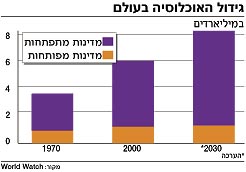According to the report of the "World Watch" Institute, in 2002 the world's population grew by only 1.18 percent * Increase in demand for bicycles
Zafarir Rinat

Direct link to this page: https://www.hayadan.org.il/worldwatch2003.html
The rapid growth rate of the earth's population has been presented for many years as problematic, due to the increasing difficulty in satisfying its needs. However, now it turns out that this trend is gradually changing - last year saw the slowest population growth since the 60s. In 2002, the population grew by only 1.18%, amounting to 6.2 billion people. In 1992, 5.4 people lived on Earth.
This figure is one of the most prominent in the 2002 "Vital Signs" report published yesterday by the American Institute "World Watch" (World Watch) in collaboration with the United Nations Environmental Protection Program (UNEP). The report, which comes out once a year, describes social, economic and environmental trends on Earth, and its importance lies in the concentration and analysis of information collected by various international bodies.
According to the report, in the world in which we live, the differences between populations that improve their standard of living and the protection of the environment, and populations in areas where existential hardships and environmental risks are worsening, are exacerbated.
The report shows that in 2002 1.7 million people died from a lack of clean water; Most of them lived in developing countries. 70% of all AIDS carriers in the world lived in the countries of central and southern Africa last year. However, only 4% of AIDS patients in middle or low income countries receive treatment against the disease. Another figure that reflects the disparities between the world's populations is that Americans and Europeans make up only 28% of the population, yet 42% of deaths from heart, blood vessel and cancer diseases - "diseases of the affluent society" - occur among them.
The slowdown in population growth is mainly related to more developed countries where the standard of living has risen, and to an increase in the proportion of women who go to work and access to contraceptives. In the 49 poorest countries in the world, the annual growth of the population still occurs at a rate of 2.4% - 10 times the rate of growth in the developed countries.
The biggest changes can be seen in countries like Indonesia and Brazil, where there has been a sharp drop in fertility rates. 50 years ago, the average number of children per woman in Indonesia was 5.5, but between 2000-1995 it dropped to 2.6. In Brazil, the fertility rate during this period dropped from 6.2 to 2.3 children on average.
However, the general trend of world population growth still continues. According to the UN estimate, in 2050 there will be 8.9 billion people on earth. The oldest population in the world will be in Japan, where the average age will rise from 41 to 53 and the population will decrease by 14%.
The environmental trends in the world are still worrisome - mainly because of the continued consumption of perishable resources and increased emission of pollution. The most serious problem to which international organizations and research institutes refer is global warming. The growth trend in the consumption of mineral fuels that causes the emission of greenhouse gases continued last year as well, when more than six million tons of carbon were emitted into the air - about a quarter of them in the US alone. The average temperature on Earth in 2002 was 14.52 degrees Celsius - the second hottest year since measurements began about 200 years ago (the hottest year was 1998).
World Watch warns that one of the side effects of the warming will be an increase in the sea level, which will severely damage the countries that exist on small islands. "There is a real fear that for the first time in history a sovereign state will lose its entirety due to climate change," the report states. According to the authors, New Zealand, for example, has already prepared plans to absorb the residents of Tuvalu, a tiny island nation in the Pacific Ocean. In the Maldives in the Indian Ocean, the authorities have already evacuated residents from small islands to larger islands due to fear of flooding due to rising sea levels.
In recent reports, World Watch also makes sure to highlight trends of positive change in the environmental field - such as the development of non-polluting means of transportation and electricity. The new report mentions the increase in bicycle production and the significant increase in the utilization of wind energy. In the field of bicycle production, China is particularly prominent, which last year produced more than half of the number of pairs of bicycles in the world. In wind energy, production capacity increased last year by 27% compared to 2001, and it continues to be the fastest growing energy sector in the world.
World Watch website
Environmentalist - Earth
https://www.hayadan.org.il/BuildaGate4/general2/data_card.php?Cat=~~~534317886~~~61&SiteName=hayadan

One response
I want the population of the world for a year.